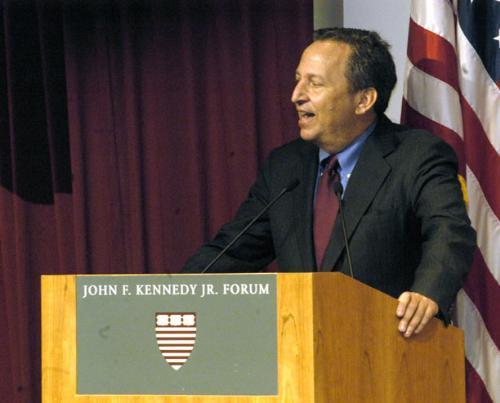
News
Garber Announces Advisory Committee for Harvard Law School Dean Search

News
First Harvard Prize Book in Kosovo Established by Harvard Alumni

News
Ryan Murdock ’25 Remembered as Dedicated Advocate and Caring Friend

News
Harvard Faculty Appeal Temporary Suspensions From Widener Library

News
Man Who Managed Clients for High-End Cambridge Brothel Network Pleads Guilty
Donor Gives $10 Million to KSG
Rubenstein gives largest unrestricted donation ever to Kennedy School

n an effort to encourage more students to attend public policy and government schools, a donor has given $10 million in unrestricted funds to the Kennedy School of Government (KSG), University President Lawrence H. Summers said in a surprise announcement yesterday evening.
The donation by David M. Rubenstein, co-founder of the private equity firm The Carlyle Group, is the largest unrestricted gift ever given to the Kennedy School and ranks among the largest overall donations it has received.
“This gift shows an important commitment to providing support for our own graduates who may not live in the biggest houses but are doing the most important work for our society,” Summers said when he introduced Rubenstein before the crowd of 300 students, faculty and administrators gathered in the school’s Forum.
And in exchange for Rubenstein’s gift, the Kennedy School will rename its One Eliot Street building after him.
Kennedy School Dean David Ellwood said the donation offers unprecedented opportunities—and peace of mind.
“This gift puts me in a position now where I don’t always have to automatically say ‘No’ to things that students and faculty request,” Ellwood said yesterday. “It is a great service for the future of this school, which is a more important place than ever during such a scary time in the world.”
Rubenstein, who is the father of Alexandra N. Rubenstein ’07, said that he saw the gift as “a down-payment” and said that “many more things could be done in the future.”
Ellwood said that he would use the gift “to challenge others to donate” but he did not announce any official plans for how to spend the $10 million. He said that part of it would go toward attaching cash prizes to KSG achievement awards for faculty and students, as well as funding salaries for alums working in the public sector.
Although Rubenstein is not an alumnus of the Kennedy School, he said that he always “felt part of the K-School family” because over the years so many of his friends and colleagues have come out of the school, including faculty members David Gergen, Richard Darman, Elaine Kamarck and Graham Allison. “It really is a place that trains our future leaders.”
Rubenstein said that another reason he gave the gift was that he regretted his lack of formal training in public policy before working for the government under the Carter Administration as deputy assistant to the president for domestic policy.
“I am not a Kennedy School graduate, but I wish I were,” he said yesterday at the Forum. “When I was working in the White House, I was 27 years old and I didn’t know what I was doing at all.”
He added that the gift is “a re-payment for letting me serve my country for four years.”
Rubenstein began brainstorming the parameters of the gift during a meeting with Summers at a economics conference in Davos, Switzerland, last winter.
Although he gave the gift without restrictions, Rubenstein has set aside $1 million of the gift exclusively for a “loan forgiveness program” that would encourage KSG students to pursue low-paying careers in civic service and government.
But the $1 million is not enough to fully fund the Loan Reimbursement Assistance Program (LRAP), which pays off loans for KSG graduates who choose to work in the public sector.
“This gift is a tremendous opportunity for us,” said Ellwood at a reception with wine, shrimp, crab and spinach finger-foods following the announcement. “But it is not enough for us to rescind all the cuts from LRAP, or to return to the exact same format of the program.”
More KSG students go into the public sector now than they used to, spreading LRAP funds more thinly across the board.
In June 1997, after former Kennedy School Dean Joseph S. Nye’s first year in office, more than half of students coming out of the master’s of public policy (MPP) program took private sector jobs after graduation.
KSG spokesman Jesus Mena said that 80 percent of the MPP Class of 2003 went on to work in the public sector.
Nye loosened the LRAP eligibility requirements to encourage K-School grads to take lower-paying jobs working for government agencies and nonprofit groups.
But more grads in low-paying jobs meant more alums seeking LRAP aid, and the program’s budget mushroomed from $44,000 when Nye took office in 1996 to more than $200,000 last year.
Nye said last year that he had raised $50,000 to maintain LRAP at full strength for current students. But he added that LRAP would pose an even larger financial burden in future years.
But Ellwood noted that the Kennedy School is hardly cash-strapped.
“We have lots of people that give to the school, and we’ve seen a huge increase in donations in the last few years,” Ellwood added.
“We the students have done a lot of work to secure more money for the LRAP program, so this is great news,” said Bryan Richardson, a second-year student at the Kennedy School.
In his announcement speech, Rubenstein thanked his children for making the gift possible. “I thank my children, because while they don’t know it, it is their money that I’m giving away.”
—Staff Writer Lauren A. E. Schuker can be reached at schuker@fas.harvard.edu.
Want to keep up with breaking news? Subscribe to our email newsletter.
